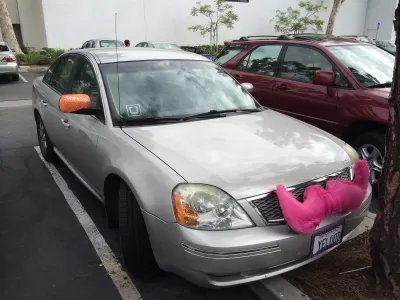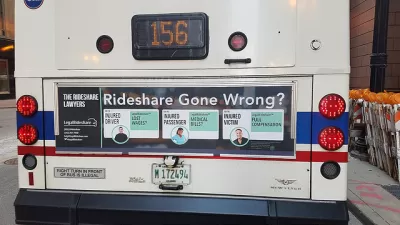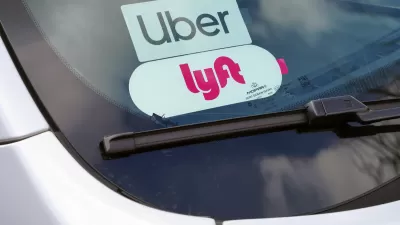New research shows that ride sharing contributes to increased congestion and decreased transit ridership.

"While ride-sharing has been credited with being more environmentally friendly than taxis and private vehicles," a new study from the the Future Urban Mobility (FM) Interdisciplinary Research Group (IRG) at Singapore-MIT Alliance for Research and Technology (SMART), MIT, and Tongji University assessing the impacts of ride-sharing on urban mobility in the U.S. found that "the entrance of TNCs [Transportation Network Companies] led to increased road congestion in terms of both intensity and duration." The study also found that public transit ridership decreased by 8.9 percent, while private car ownership experienced an "insignificant decrease of only 1 percent."
The study concluded that "easy access to ride-sharing discourages commuters from taking greener alternatives, such as walking or public transportation," and that "approximately half of TNC trips would otherwise have been made by walking, cycling, public transport, or would not have been made at all."
"The researchers think that the substantial deadheading miles (miles traveled without a passenger) by TNCs could contribute to the TNC’s negative impact on road congestion. According to some other studies, approximately 40.8 percent of TNC miles are deadheading miles." The study's authors hope that their findings "can be very useful in supporting transportation planners and policymakers in their decisions and regulations with regard to TNCs."
FULL STORY: Study finds ride-sharing intensifies urban road congestion

Planetizen Federal Action Tracker
A weekly monitor of how Trump’s orders and actions are impacting planners and planning in America.

Maui's Vacation Rental Debate Turns Ugly
Verbal attacks, misinformation campaigns and fistfights plague a high-stakes debate to convert thousands of vacation rentals into long-term housing.

San Francisco Suspends Traffic Calming Amidst Record Deaths
Citing “a challenging fiscal landscape,” the city will cease the program on the heels of 42 traffic deaths, including 24 pedestrians.

Amtrak Rolls Out New Orleans to Alabama “Mardi Gras” Train
The new service will operate morning and evening departures between Mobile and New Orleans.

The Subversive Car-Free Guide to Trump's Great American Road Trip
Car-free ways to access Chicagoland’s best tourist attractions.

San Antonio and Austin are Fusing Into one Massive Megaregion
The region spanning the two central Texas cities is growing fast, posing challenges for local infrastructure and water supplies.
Urban Design for Planners 1: Software Tools
This six-course series explores essential urban design concepts using open source software and equips planners with the tools they need to participate fully in the urban design process.
Planning for Universal Design
Learn the tools for implementing Universal Design in planning regulations.
Heyer Gruel & Associates PA
JM Goldson LLC
Custer County Colorado
City of Camden Redevelopment Agency
City of Astoria
Transportation Research & Education Center (TREC) at Portland State University
Jefferson Parish Government
Camden Redevelopment Agency
City of Claremont





























